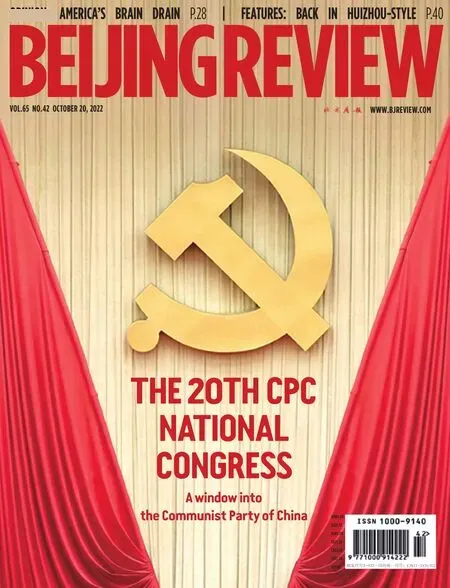STANDING WITH CHINA AND THE CPC
The 20th National Congress of the Communist Party of China (CPC) is of great significance as the whole Party and the entire nation advance toward the second centenary goal, that is, to build a modern socialist country that is prosperous, strong, democratic, culturally advanced, harmonious and beautiful by 2049, the centenary of the People’s Republic of China.In interviews withreporters Tao Xing and Peng Jiawei in the lead-up to the event, Rossana Cambron, Co-Chair of the Communist Party of the United States of America (CPUSA), and Elizabeth Rowley,leader of the Communist Party of Canada, shared their views on the bilateral relationship and CPC governance. Edited excerpts of the interviews follow:
: What are your comments on China’s achievements, for example, the eradication of extreme poverty,under the leadership of the CPC?Rossana Cambron: Under the leadership of the CPC, China has lifted more than 770 million people out of extreme poverty over the past 40-plus years. This remarkable statistic accounts for 70 percent of global poverty alleviation.
Another one of China’s many recent achievements is the creation of the Belt and Road Initiative to build a trade and infrastructure network connecting Asia with Europe and Africa along and beyond the ancient Silk Road trade routes.

The initiative was unveiled by President Xi Jinping during his visits to Central and Southeast Asia in September and October 2013.It focuses on promoting policy coordination, connectivity of infrastructure and facilities, unimpeded trade, financial integration and closer people-to-people ties through a consultative process and joint efforts, benefiting all.
The initiative does not only help bring development to many developing nations but also serves as a diplomatic bridge to bring the people of the world together for peaceful coexistence and shared prosperity.
How do you see President Xi’s vision and role in the development of China and the CPC?
Cambron: President Xi’s four volumes of(a compilation of his spoken and written works) provide an excellent outline of the theory and practice of the CPC since he became the leader of the Party. Xi is an intellectual thinker and writer and the transcriptions of his speeches show a deep understanding of Marxist-Leninist thought and a commitment to building socialism with Chinese characteristics.
The broad fields of inquiry from international diplomacy to environmental protection provide a rigorous contribution to Marxist thought. The book series conveys Xi’s dedication to the economic growth of China within the context of socialism, to a shared future for the world community, to the application of Marxism-Leninism within the context of China’s unique history, and to meeting the centenary goals.
What’s your opinion on the trend of the China-U.S. relationship?What have been the main reasons behind China-U.S. conflict in recent years?
Cambron: The U.S. has seen its international hegemonic power decline over the last two decades.The decline is largely one of its own doing due to its aggressive foreign policy both militaristically and economically. At the same time, the U.S. economy has seen minimal growth and vastly uneven distributions of wealth leading to poverty, homelessness and extreme debt, while the wealthiest Americans continue to see record profits.More recently, the Federal Reserve mismanaged the economy during the COVID-19 pandemic, and we now have staggering levels of inflation which, ultimately, will lead to recession.
Unfortunately, the U.S.government cannot accept accountability for its own failings,and in turn needs to distract its population with nationalistic saberrattling against China, a country it perceives as strong and growing in world influence.
After the U.S. midterm elections in November, the rhetoric against China should lessen. However, because China will continue to offer an alternative approach to foreign policy with peaceful coexistence with the world community and a domestic economy centered on eradicating poverty and socialist growth, the American government will likely continue to wage its ideological battle against China.
Yet the U.S. understands its economy is deeply tied to China and that China is a peaceful country with no history of aggression,so this conflict will remain purely ideological.
Even the trade tariffs may be removed if the recession lasts long enough or becomes worse than expected.
How does the CPUSA view the U.S. government’s interference in the Taiwan question?
C a m b r o n: T h e C P U S A understands that Taiwan has always been a part of China’s territory.We see the historic mission of national reunification as a domestic issue for the Chinese people and any interference by outside governments or organizations as a violation of China’s sovereignty.It is of primary importance to our party to go against the irresponsible and aggressive recent actions taken by American politicians to generate hostility in the Taiwan Straits. We stand with the Chinese people to solve their domestic issues and will continue to organize against American imperialism abroad.
What is the CPUSA’s approach to developing the China-U.S.relationship?
Cambron: One possibility that could challenge the anti-China rhetoric in the U.S. would be for the American people to become more aware of the multitude of social, environmental and cultural projects in China today. For instance, most Americans don’t know about China’s accessible healthcare program, its exceeding of UN environmental quotas, new sustainable technology and infrastructure, eradication of poverty, labor rights, gender equality, equality of the 56 distinct ethnicities, and sustainable agriculture, just to name a few topics most Americans would support.
The CPUSA’s approach to the anti-China rhetoric coming in from both government and media is to tell the truth about China. Through our media channels, we routinely publish articles and videos on the eradication of poverty, environmental protection, technological advancements and China’s impressive infrastructure projects in developing nations.
What message would you like to send to the CPC and China at large?
Cambron: We send solidarity greetings and congratulations on the 20th CPC National Congress. We are encouraged by the many successes of the CPC that for us provide examples that change is possible in alleviating poverty, homelessness and universal healthcare.We wish the Party all the best for a successful congress and look forward to a lifetime of international solidarity between the CPUSA and the CPC.
What do you think of China’s achievements over the past decade under CPC leader
ship?Elizabeth Rowley: They are truly remarkable. The CPC and the Chinese Government are committed to making changes that will benefit people and can make great things happen in a very short time.One of the most impressive things was the lifting of more than 770 million people out of extreme poverty in the 40-plus years since the late 1970s.
China is focusing on its 2035 goal, namely, to become a medium-level developed country in terms of per-capita GDP, and the 2049 goal of building a modern socialist country that is prosperous, strong, democratic,culturally advanced, harmonious and beautiful by the centenary of the founding of the People’s Republic of China.
The country is moving toward further improvements in terms of living standards and access to higher education, healthcare, and so forth. The objective of raising living standards to the level of relatively high development goes unmatched in the world. No other country has this kind of goal, let alone the ability to deliver on it.

On the international stage, China has played a very important role.
For example, the Belt and Road Initiative [proposed in 2013 to improve transcontinental connectivity and cooperation] has allowed many developing countries to make cooperation deals with China that benefit those countries, as opposed to the kind of trade agreements imperialism delivers—exploitative and leaving those countries in impoverished chaos.
Then there’s the growing danger of war everywhere. Many countries are being drawn into imperialism,driven to war and aggression and interfering with the sovereignty and independence of other countries. We recognize China’s efforts at diplomacy to prevent the kinds of conflicts that might lead to war.
These are some of the reasons why China’s influence is growing and U.S. influence is waning on the international stage.What do you believe to be the biggest difference between the CPC’s governance and Western politics?
Rowley: One is a government that fights for the interests of the people.The other is a government that fights for the interests of corporations and tries to convince the working people that is a good idea.
In Canada, politicians have made promises on raising living standards,creating jobs and higher wages, and improving the environment for many years. But once elected, suddenly all of this appears to no longer be possible.
We find taxes for corporations are falling, funding for the military is increasing and social programs are being cut. We see living standards and wages falling sharply with inflation and corporations making massive profits. And these businesses pollute the environment. Some of the parties are based on racism, division; very right-wing politics, very dangerous right-wing populism.

A shopping plaza in Beijing buzzes with visitors on October 6
So people are critical of and unhappy with the Canadian Government.
治疗:更昔洛韦 5.0~7.5 mg/kg,静脉滴注,每12小时1 次,14~21 d;然后 5 mg·kg-1·d-1序贯维持治疗。 也可使用膦甲酸钠 180 mg·kg-1·d-1,分 2~3 次用 (静脉应用需水化),2~3 周后改为 90 mg·kg-1·d-1,静脉滴注,1 次/d。病情危重或单一药物治疗无效时可二者联用。CMV视网膜脉络膜炎可球后注射更昔洛韦。
We see the process the CPC is going through, involving the public in the discussions about what the future will look like, what the priorities are and what people want. This picture is quite different from that in Canada.
We’re optimistic about China’s future. We are optimistic about the ability of working people around the globe to compel the kind of fundamental social change that leads to socialism. Socialism is the future.
We respect China’s economic model as it is a way to rapidly develop both technology and the economy.But we also recognize it comes with numerous challenges. We notice, for example, that the CPC runs a campaign against corruption, which is important because that is a campaign supporting socialism.
We believe the CPC and the people of China are able to create the path toward that future.
Why are party-to-party exchanges important to the two countries?
Rowley: I had the opportunity to visit China four years ago as a guest of [the International Department of] the CPC Central Committee. We were able to see firsthand the many changes within the country that the CPC and the government and the people of China achieved in a very short period.
It’s a lot more expensive for ordinary people to travel halfway around the world to Asia, to see China,and to see what the truth about China is. But you can’t get accurate information about what is happening in China, or the world, from the Canadian and U.S. news broadcasters.
It is very important for us to be able to see firsthand what these significant, big and important changes are in the country and to be able to convey that information here to those Canadians who want to know.
What message would you like to send to the CPC and China at large? What do you expect the CPC will achieve in the coming years?Rowley: We are wishing all the best during this important congress;its documents and outline for the country’s further development will be very important. We know there has been a lot of discussion among the 1.4 billion Chinese people,including the 96 million CPC members, about the way forward.
This will be very important for China as well as people worldwide.We wish the Party good luck and look forward to hearing the results.
We have good faith that the Party and the Chinese state will achieve success. The 2035 and 2049 goals will be important to people around the world. Many are looking at China, hoping and wishing it will succeed in these goals. And so are we. BR

